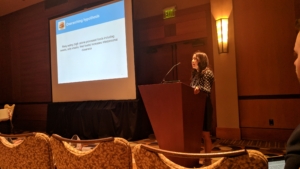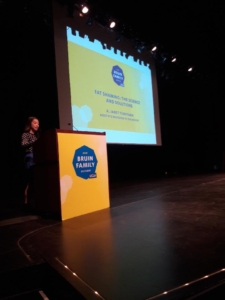A couple weeks ago, Dr. T & Jeff attended the Annual Meeting of the Society for Experimental Social Psychology in Seattle. They were part of a symposium full of DiSH Lab collaborators: Drs. Catharine E. Fairbairn, Eli Puterman, Aric A. Prather, and DiSH graduate Dr. Jenna R Cummings! The symposium was titled, “Eat, Drink, (Exercise, Sleep Well) and Be Merry? How Health Behaviors Affect Our Social World.” Here’s Dr. T presenting her talk with Jenna on: “Social closeness shifts after unhealthy eating with strangers and friends.”

Dr. Fairbairn’s talk was titled “Drinking with Strangers: Examining the Effect of Social Familiarity on Alcohol’s Emotional Rewards in Everyday Life.” Dr. Puterman’s talk was titled “Physical activity as psychological resiliency: Its role in mitigated negative affective reactivity to naturally occurring and laboratory stressors.” And Dr. Prather’s talk was titled “Poor sleep as a contributor to negative affect in response to stressful events.”
The conference was a great experience and we’re looking forward to attending next year!


